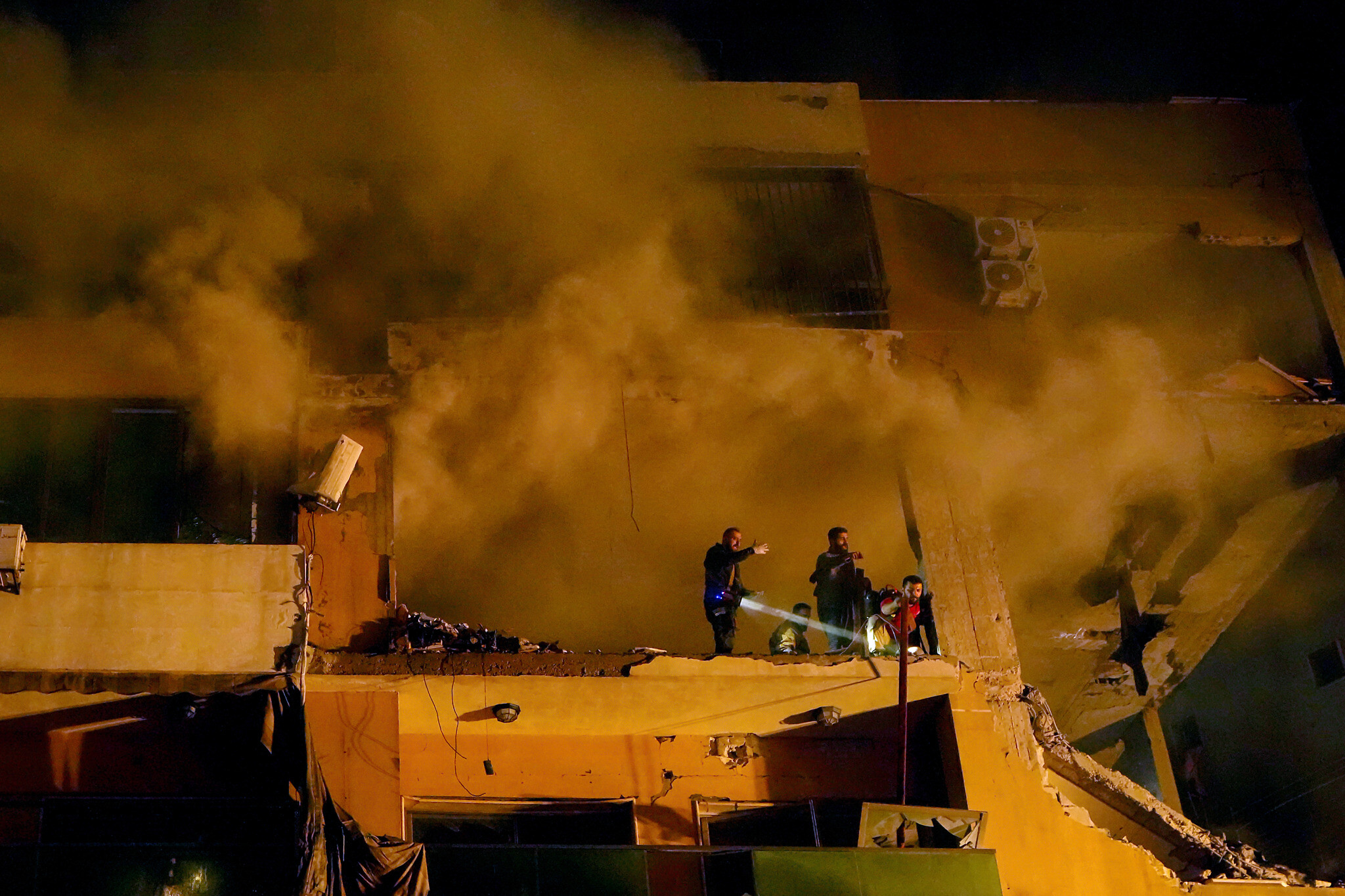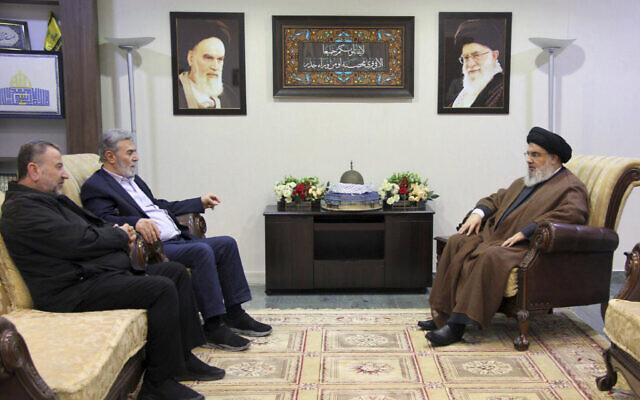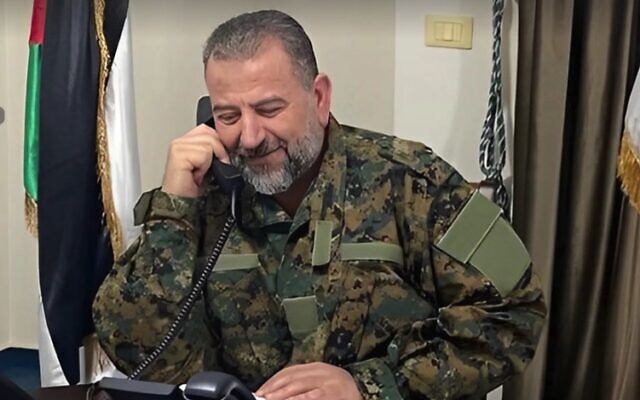



Hamas leader Ismail Haniyeh declared the Gaza-ruling terror group would not be deterred after his deputy Saleh al-Arouri was killed Tuesday in an alleged Israeli strike in Beirut, while Lebanon’s Hezbollah vowed the “crime” would not go unpunished and launched several cross-border attacks on northern Israel.
“A movement whose leaders and founders fall as martyrs for the dignity of our people and our nation will never be defeated,” Hamas chief Ismail Haniyeh, who is based in the Qatari capital of Doha, said in a televised address.
Haniyeh, who is considered a top target for Israel after the Hamas-led October 7 atrocities in southern Israel, vowed the targeted killing would increase Hamas’s “strength, toughness, and unyielding determination.”
Arouri, wanted for years by Israel and seen as the group’s prime orchestrator of West Bank terrorism, was killed in an Israeli drone strike in the Beirut suburb of Dahiyeh, officials with Hamas and the Lebanese terror group Hezbollah said.
Hamas, in a statement eulogizing Arouri and confirming the identities of five other members who were killed with him, called it a “cowardly assassination operation, carried out by the Zionist enemy, in a barbaric aggression and a heinous crime.”
Israeli officials have declined to comment.
Hezbollah vowed that it would respond to the assassination, which happened in an area of Beirut considered a stronghold of the Iran-backed Lebanese terror group, although it has already been carrying out daily attacks on northern Israel since October 8.
“We affirm that this crime will never pass without response and punishment,” Hezbollah said in a statement, asserting its fighters were at heightened readiness to retaliate.
Hezbollah called the alleged Israeli strike “a serious assault on Lebanon, its people, its security and its sovereignty… and a dangerous development in the course of the war between the enemy and the axis of resistance.”
“The criminal enemy — which after ninety days of crime, killing and destruction was unable to subjugate Gaza — is resorting to a policy of assassination… of… whoever planned, carried out or supported” Hamas’s October 7 terror onslaught, Hezbollah further charged, highlighting the alleged Israeli assassination in Syria last week of Razi Moisavi, a senior officer in Iran’s Islamic Revolutionary Guard Corps.
Hezbollah warned such killings would only further embolden Palestinian resistance to Israel.

The terror organization also took responsibility for ten separate attacks on northern Israel Tuesday, four of them after Arouri was assassinated.
In statements, Hezbollah claimed to have launched missiles and drones at army positions along the border. In some of the attacks, however, projectiles hit northern Israeli communities.
According to Hebrew-language media reports, two soldiers were lightly wounded by an anti-tank missile that Hezbollah fired at a military position near the community of Menara, close to the Lebanon border.
There was no confirmation from the military.
Amid the threats from Hamas and Hezbollah, Israel Defense Forces Spokesman Rear Adm. Daniel Hagari said the military was ready to deal with any development.
“The IDF is at a very high level of readiness, in all arenas, in defense and offense. We are in a high state of readiness for any scenario,” Hagari said during a press conference, without explicitly mentioning al-Arouri.
“The most important thing to say tonight is that we are focused and remain focused on fighting Hamas,” Hagari added.
According to Hebrew media-language media reports, Israel is anticipating a response to the killing Arouri. Both the Walla news site and Channel 13 news said Israel expects a retaliation, including possible long-range rocket fire on Israel.

Meanwhile, Iran Foreign Ministry spokesman Nasser Kanaani condemned Israel’s “despicable” killing of Arouri.
“The martyr’s blood will undoubtedly ignite another surge in the veins of resistance and motivate the fight against the Zionist occupiers, not only in Palestine but also in the region and among all freedom-seekers worldwide,” Kanaani said.
Palestinian Authority Prime Minister Mohammad Shtayyeh also decried the killing, calling it a “crime perpetrated by known criminals.” He warned about the “risks and consequences that could follow,” according to a statement issued by his office.
Israel has vowed to target all Hamas leaders after the terror group’s devastating October 7 attack on Israel, in which some 1,200 people — mostly civilians — were killed and around 240 taken hostage.
If Israel was behind the attack it could mark an escalation in the regional conflict. Hezbollah has been carrying out attacks against Israel’s north since the war in Gaza began, citing support for Hamas, leading to limited but daily clashes along the border amid concerns of a larger war.
Hezbollah leader Hassan Nasrallah has vowed to retaliate against any Israeli targeting of Palestinian officials in Lebanon. Arouri was regarded as close to Nasrallah and was reportedly scheduled to meet with him on Wednesday, when the Hezbollah chief is slated to give a nationally televised address.
“Any assassination on Lebanese soil against a Lebanese Syrian, Iranian, or Palestinian will be met with a decisive response. We will not tolerate this, and we will not allow Lebanon to become a new killing field for Israel,” Nasrallah said during a speech in August, which resurfaced after Arouri was killed.
Hezbollah and the Israeli military have been exchanging fire almost daily over the Israeli-Lebanese border since Israel’s military campaign in Gaza began nearly three months ago. So far the Lebanese group has appeared reluctant to dramatically escalate the fighting, though a significant response now could send the conflict spiraling into an all-out war on the northern border.
The skirmishes on the border since October 8 have resulted in four civilian deaths on the Israeli side, as well as the deaths of nine IDF soldiers. There have also been several attacks from Syria, without any injuries.
Hezbollah has named 138 members who have been killed by Israel during the ongoing skirmishes, mostly in Lebanon but some also in Syria. In Lebanon, another 19 operatives from other terror groups, a Lebanese soldier, and at least 19 civilians, three of whom were journalists, have been killed.

